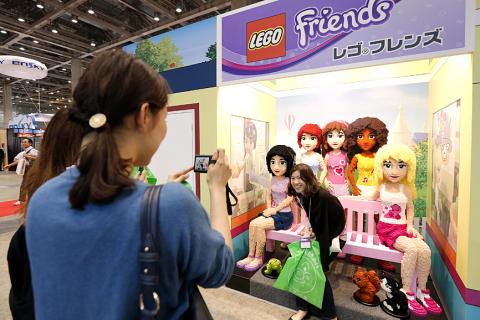A toy helicopter created from cannibalized smartphones was among the main attractions at a huge toy show in Tokyo yesterday, where producers were targeting the young and the young-at-heart.
The motor that makes a mobile phone vibrate powers the rotor blades on the Nano-Falcon, which its makers say is the world’s smallest radio-controlled helicopter.
The 6.5cm machine weighs just 11g, has a range of just 5m and can fly for five minutes, but its makers say they are feeding the fantasies of adults who never really grew up.

Photo: EPA
“Japan’s aging population made us think of developing a toy targeting adults,” said Naoki Nakagawa, head of sales at maker CCP.
“Ten or twenty years ago, helicopter toys could cost a lot of money. Those who couldn’t afford it at the time can now make their childhood dream come true at a reasonable price,” Nakagawa said.
The mini machine retails at around ¥4,700 (US$50), a price company spokeswoman Kiyoko Hayasaki said came from its use of bits of mobile phones.
“We were able to set the price at this relatively cheap level because we took some key parts from stocks that are widely available in the market for smartphones,” she said.
Elsewhere at the exhibition, toymakers were showcasing tablet computers specifically for small children.
“Children like to emulate what adults do, and a survey said 90 percent of tablet computer users let their children use their tablets,” said Yuki Itagaki, a spokeswoman for MegaHouse, a subsidiary of major Japanese toy maker Bandai Namco Holdings.
MegaHouse’s “tap me” is a tablet specifically developed for use by children aged between four and eight, with built-in parental controls, including a timer that limits use.
Despite its price tag of ¥20,790, MegaHouse aims to sell 100,000 “tap mes” in the coming 12 months.
US toy maker Mattel Inc was showing off its Apptivity Monkey, a fluffy monkey designed to hold Apple Inc’s iPhone — and protect it from over-enthusiastic toddlers, who can press buttons on the creature’s limbs to create music.
Japan’s Takara Tomy has a stand for the iPhone that dances along to the music it is playing.
The International Tokyo Toy Show ends tomorrow at Tokyo Big Sight in the Japanese capital’s bay area, with today and tomorrow open to the public.

The US dollar was trading at NT$29.7 at 10am today on the Taipei Foreign Exchange, as the New Taiwan dollar gained NT$1.364 from the previous close last week. The NT dollar continued to rise today, after surging 3.07 percent on Friday. After opening at NT$30.91, the NT dollar gained more than NT$1 in just 15 minutes, briefly passing the NT$30 mark. Before the US Department of the Treasury's semi-annual currency report came out, expectations that the NT dollar would keep rising were already building. The NT dollar on Friday closed at NT$31.064, up by NT$0.953 — a 3.07 percent single-day gain. Today,

‘SHORT TERM’: The local currency would likely remain strong in the near term, driven by anticipated US trade pressure, capital inflows and expectations of a US Fed rate cut The US dollar is expected to fall below NT$30 in the near term, as traders anticipate increased pressure from Washington for Taiwan to allow the New Taiwan dollar to appreciate, Cathay United Bank (國泰世華銀行) chief economist Lin Chi-chao (林啟超) said. Following a sharp drop in the greenback against the NT dollar on Friday, Lin told the Central News Agency that the local currency is likely to remain strong in the short term, driven in part by market psychology surrounding anticipated US policy pressure. On Friday, the US dollar fell NT$0.953, or 3.07 percent, closing at NT$31.064 — its lowest level since Jan.

The New Taiwan dollar and Taiwanese stocks surged on signs that trade tensions between the world’s top two economies might start easing and as US tech earnings boosted the outlook of the nation’s semiconductor exports. The NT dollar strengthened as much as 3.8 percent versus the US dollar to 30.815, the biggest intraday gain since January 2011, closing at NT$31.064. The benchmark TAIEX jumped 2.73 percent to outperform the region’s equity gauges. Outlook for global trade improved after China said it is assessing possible trade talks with the US, providing a boost for the nation’s currency and shares. As the NT dollar

The Financial Supervisory Commission (FSC) yesterday met with some of the nation’s largest insurance companies as a skyrocketing New Taiwan dollar piles pressure on their hundreds of billions of dollars in US bond investments. The commission has asked some life insurance firms, among the biggest Asian holders of US debt, to discuss how the rapidly strengthening NT dollar has impacted their operations, people familiar with the matter said. The meeting took place as the NT dollar jumped as much as 5 percent yesterday, its biggest intraday gain in more than three decades. The local currency surged as exporters rushed to